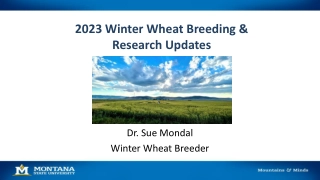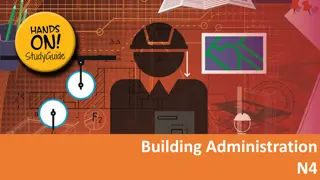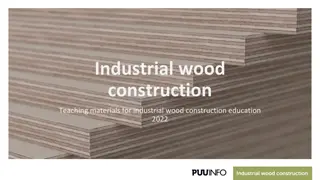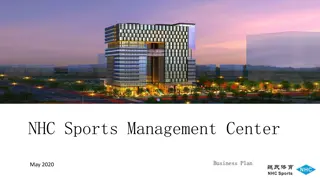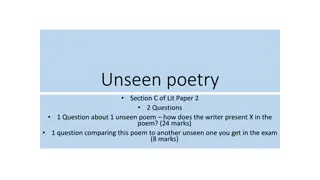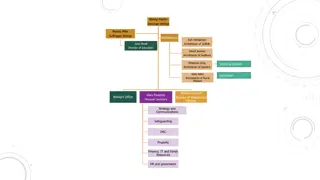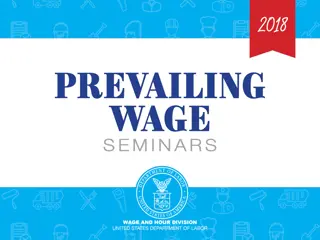
Winter School 2023 Construction Updates - Clint Bishop
Stay informed about the latest administration updates in Winter School 2023 construction provided by Clint Bishop. Topics include VECPs, dispute resolution, failure to complete on time, mitigation, and more.
Download Presentation

Please find below an Image/Link to download the presentation.
The content on the website is provided AS IS for your information and personal use only. It may not be sold, licensed, or shared on other websites without obtaining consent from the author. If you encounter any issues during the download, it is possible that the publisher has removed the file from their server.
You are allowed to download the files provided on this website for personal or commercial use, subject to the condition that they are used lawfully. All files are the property of their respective owners.
The content on the website is provided AS IS for your information and personal use only. It may not be sold, licensed, or shared on other websites without obtaining consent from the author.
E N D
Presentation Transcript
Winter School 2023 Winter School 2023 Construction Administration Updates Clint Bishop
Topics Topics 100 Spec Updates 105.19 VECP s 108.02 Dispute Resolution 108.07 Failure to Complete On- Time Proposal Note Updates PN 108 Dispute Resolution Board PN 109 Dispute Resolution Advisor PN 111 Facilitated Partnering PN 133 Buy America Supplement Updates Supplement 1131 Contractor Performance (C-95) Retroactive Fuel and Steel Price Adjustments - Highlights Material Shortages
105.19 Value Engineering Change Proposals 105.19 Value Engineering Change Proposals Minor revisions to align with Supplement 1113 (revised 2021) One significant revision: The Contractor shall have no claim against the Department for any costs or delays due to the Department s review or rejection of the initial VECP.
108.02.F Mitigation and Notice 108.02.F Mitigation and Notice F. Mitigation and Notice. Mitigation of any issue, whether caused by the Department, Contractor, third-party or an intervening event, is a shared contract and legal requirement. Mitigation efforts include, but are not limited to, re-sequencing work activities, acceleration, and substitution of materials. The Contractor and Engineer must explore and discuss potential mitigation efforts in a timely manner. Mitigation efforts which materially change the Work, are clearly attributable to the dispute, and are performed to mitigate an excusable compensable delay is compensable to the extents as determined by the Engineer.
108.02.G Dispute Resolution 108.02.G Dispute Resolution Failure to meet any of the timeframes outlined below or to request an extension will terminate further review of the dispute and serve as a waiver of the Contractor s right to file a claim. Failure by the Department to meet the timeframes outlined in this section will be a de facto equivalent time extension to the Contractor for the subsequent Dispute Resolution and Administrative Claims Process step.
108.07 Failure to Complete on Time 108.07 Failure to Complete on Time TABLE 108.07-1 SCHEDULE OF LIQUIDATED DAMAGES Amount of Liquidated Damages to be Deducted for Each Calendar Day of Overrun in Time Original Contract Amount (Total Amount of the Bid) From More Than $0.00 $500,000 $2,000,000 $10,000,000 Over $50,000,000 To and Including $500,000 $2,000,000 $10,000,000 $50,000,000 $400450 $600650 $9001,000 $1,6501,700 $3,9703,100
Proposal Note 108 Dispute Resolution Board Proposal Note 108 Dispute Resolution Board Proposal Note 109 Dispute Resolution Advisor Proposal Note 109 Dispute Resolution Advisor Change pay item from lump sum to each
Proposal Note 111 Facilitated Partnering Proposal Note 111 Facilitated Partnering Change pay item from lump sum to each
Proposal Note 133 Products Made in the Proposal Note 133 Products Made in the United States United States On November 15, 2021, President Biden signed into law the Infrastructure Investment and Jobs Act (IIJA). This requires that no later than 180 days after enactment (May 14, 2022) that none of the funds made available for a Federal financial assistance program for infrastructure, including each deficient program, may be obligated for a project unless all of the iron, steel, manufactured products, and construction materials used in the project are produced in the United States.
Proposal Note 133 Products Made in the Proposal Note 133 Products Made in the United States United States April 28, 2022 Department Of Transportation Public Interest Waiver Extend requirements 180 days
Proposal Note 133 Products Made in the Proposal Note 133 Products Made in the United States United States Recipients of an award of Federal financial assistance from a program for infrastructure are hereby notified that none of the funds provided under this award may be used for a project for infrastructure unless: (1) all iron and steel used in the project are produced in the United States--this means all manufacturing processes, from the initial melting stage through the application of coatings, occurred in the United States;
Proposal Note 133 Products Made in the Proposal Note 133 Products Made in the United States United States (2) all manufactured products used in the project are produced in the United States this means the manufactured product was manufactured in the United States; and the cost of the components of the manufactured product that are mined, produced, or manufactured in the United States is greater than 55 percent of the total cost of all components of the manufactured product, unless another standard for determining the minimum amount of domestic content of the manufactured product has been established under applicable law or regulation; and
Proposal Note 133 Products Made in the Proposal Note 133 Products Made in the United States United States October 2022 FHWA 1983 Waiver for Manufactured Products came to light. FHWA backed off Manufactured Product requirements and proposed revisiting the waiver in the near future. Currently Manufactured Products are exempt from the 55% domestic requirement
Proposal Note 133 Products Made in the Proposal Note 133 Products Made in the United States United States (3) all construction materials are manufactured in the United States this means that all manufacturing processes for the construction material occurred in the United States. Construction materials includes an article, material, or supply other than an item of primarily iron or steel; a manufactured product; cement and cementitious materials; aggregates such as stone, sand, or gravel; or aggregate binding agents or additives that is or consists primarily of: non-ferrous metals; plastic and polymer-based products (including polyvinylchloride, composite building materials, and polymers used in fiber optic cables); glass (including optic glass); lumber; or drywall.
Proposal Note 133 Products Made in the Proposal Note 133 Products Made in the United States United States Proposal Note 133 published on October 21, 2022 with all current guidance and inserted into new projects going out to bid. Applies to projects signed in Fiscal Management Information System (FMIS) by FHWA on November 10, 2022 or later. This generally happens just before a project is advertised.
Proposal Note 133 Products Made in the Proposal Note 133 Products Made in the United States United States Future Changes November 7, 2022. US DOT has a proposed language to waive de minimis amounts of iron and steel, manufactured products and construction materials used in infrastructure project administered by the US DOT: a. The total value of the non-compliant products is no more than the lesser of $1,000,000 or 5% of total allowable costs under the Federal financial assistance award; b. The size of the Federal financial assistance award is below $500,000; or c. The non-domestically produced miscellaneous minor components comprise no more than 5% of the total material cost of an otherwise domestically produced iron or steel product. Office of Materials Management is requesting affidavits from Manufactured Products vendors that items are manufactured 55% by cost domestically. This allows us to adjust more quickly, if FHWA revisits Manufactured Products waiver language.
Supplement 1131 Supplement 1131 Procedure for Evaluation Procedure for Evaluation of Contractor Performance (C of Contractor Performance (C- -95) 95) Four additional questions relative to ODI contractual responsibilities Certified Payroll Prompt Payment C92 s submitted before subcontractor tries to start work Affirmative Action (Projects over $20 million) Scored by District Compliance Officer, not Construction
Retroactive Fuel Price Adjustments Retroactive Fuel Price Adjustments Diesel Fuel in February 2022 with existing PN 520 $8.0000 Diesel Fuel in February 2022 with existing PN 520 $7.0000 $6.0000 $5.0000 +50% $4.0000 $3.0000 $2.81 $2.0000 -50% $1.0000 $-
Retroactive Fuel Price Adjustments Retroactive Fuel Price Adjustments Diesel Fuel in July 2022 with new PN 520 dated 7/15/22 $8.0000 Diesel Fuel in July 2022 with new PN 520 dated 7/15/22 Increases from 50% to 100% Decreases from 50% to 75% +100% $7.0000 $6.0000 $5.0000 $3.88 $4.0000 $3.0000 $2.0000 -75% $1.0000 $-
Retroactive Fuel Price Adjustments Retroactive Fuel Price Adjustments Diesel Fuel in October 2022 with PN 520 Retroactive $8.0000 Diesel Fuel in October 2022 with PN 520 Retroactive Increases from 50% to 100% Decreases from 50% to 75% 100% State over 50% $7.0000 +100% State Funded $6.0000 +100% $5.0000 $4.0000 $3.0000 $2.81 $2.0000 $1.0000 -75% $-
Retroactive Steel Price Adjustments Retroactive Steel Price Adjustments Steel Prices $100.00 Similar revisions to PN 525 Steel Price Adjustments Increases from 50% to 100% Decreases from 50% to 75% $95.00 $90.00 $85.00 $80.00 $75.00 $70.00 $65.00 $60.00 Category 1 .Catagory 2
Material Shortages 2023 Material Shortages 2023 Resin, cement, Other? Explore alternate materials, resequencing the work or alternate means to mitigate the material shortage Area wide material shortages are considered an excusable, non- compensable delay in accordance with Construction & Material Specifications (C&MS) 108.06.B.3. These types of delays are considered Acts of God or a Force Majeure delay. They are due to no fault of the owner and no fault of the contractor.
Questions & Contact Information Questions & Contact Information Clint Bishop, P.E. Construction Administration Staff Specialist Office of Construction Administration 1980 W. Broad Street, Columbus, Ohio 43223 (p) 614.387.1164 clint.bishop@dot.ohio.gov transportation.ohio.gov

